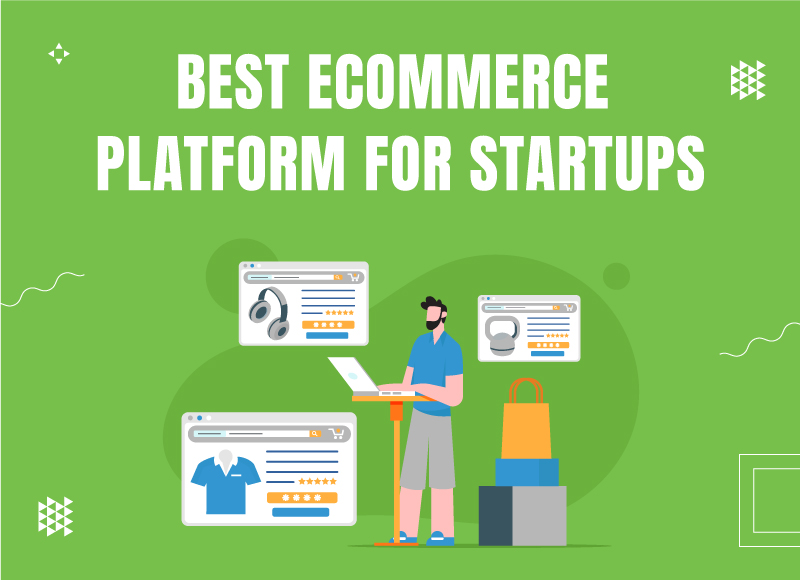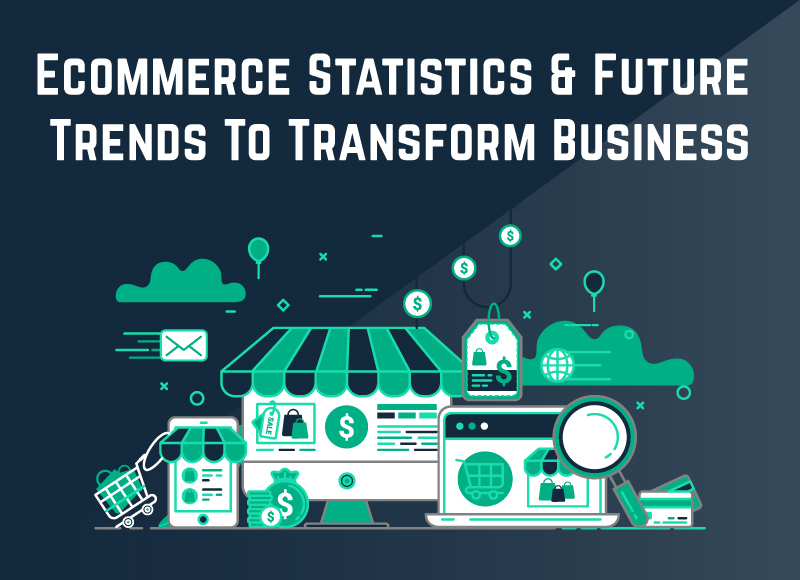- Home
- Infographics
- How to Choose The Best E-commerce Platform for Your Startups
How to Choose The Best E-commerce Platform for Your Startups
-
Last Updated:
13 Sep 2022
-
Read Time:
N/A Min Read
-
Written By:
 Jane Hart
Jane Hart
-
835
Table of Contents
Startups & Small Business must check out this list of the best ecommerce platforms for expanding their business online.

There are 12 to 24 million eCommerce sites, and less than 1 million make $1000 per month. So while the eCommerce trend is strong, there is plenty of room for newcomers to grow. An eCommerce is essentially an online business as seen and perceived through its eCommerce website. An online business receives all its customers on the website and must be ready to receive them, engage them, and prompt them to make the purchase.
Retail eCommerce sales in 2021 were $4.9 trillion, and they were expected to grow 50% to $7.4 trillion by 2025. Ecommerce startups valued above $1 billion make a $114 billion industry, while in China, eCommerce businesses produce the highest number of unicorns.

What is an eCommerce Platform?
Experienced eCommerce web designers know the factors that play a crucial role in engaging and converting visitors, giving the staff tools to manage the different functions of the platform, from inventory management to running sales and marketing campaigns.
An e-commerce platform is a website development framework with many solutions required for designing and setting up an eCommerce site. The requirement of an eCommerce site is different as it needs to integrate payments, shipping, fulfillment, security, carts, and various other features that make it a back-end heavy project. It needs website developers with coding knowledge and assorted web development frameworks available for the front-end and back-end.
How an Ecommerce platform helps
An e-commerce platform anticipates the needs and presents an enabling environment with easy-to-use resources for the developers to take the project to the next and final stage. Some of these platforms allow e-commerce startups to set up their online store within half an hour and for free.
But large and complex projects can take longer. Quick data processing, an excellent user interface, and easy and effective third-party integrations are some of the basic requirements. Considering all these factors, eCommerce platforms have scores to fit all needs and ambitions.
How to choose your startup platform?
Whether you want to build an online marketplace or a store, eCommerce platforms let you do this at all price points -- from $0 to $10 to $10,000 a month.
Given this, how would startup founders know which platform is suitable for their businesses? This post tries to answer this query and help you find a perfect solution.
Some of the basic features that most eCommerce platforms try to offer to make the startup journey smooth and successful are as follows:
- Ease of Use
- Good SEO features
- Inventory tracking
- Fulfillment and Shipping
- Scalability
- Security
While all e-commerce platforms will claim to have these features, it's recommended that you discuss it with your eCommerce development agency for a clear understanding of what you are buying.
What platform options do you have?
There are two ways to look at this issue. First, in terms of technology that you want to buy and work with, here are some of the prominent options:
Open source eCommerce platforms
They give you endless customization and scalability potential but leave it to you to develop, maintain, and secure your online business. The support comes from the community rather than a company. Some of the top open source eCommerce platforms are Magneto, WooCommerce, and Prestashop.
SaaS eCommerce platforms
They offer a degree of ready solution for development, maintenance, and security but offer limited customization and scalability issues. It's a subscription-based service, and you never own it. Some of the leading platforms in this category are Shopify, Volusion, Squarespace, Wix, and Shift4Shop.
Headless eCommerce platforms
They focus on excellent user experience by bringing the next level of flexibility, speed, and customization possibilities. It's because the headless approach decouples the back-end and front-end. Magneto, Shopify Plus, BigCommerce, and Salesforce Commerce Cloud are among the top names in this category.
Online marketplace or store
Another important thing a startup must consider before choosing an eCommerce platform is whether to set up an online marketplace or an online store. Some platforms support marketplaces better than others. These are Magneto, Shopify, WooCommerce, OpenCart, and Bagisto, to name a few. Of course, they also support online stores, but in this space, you have some other prominent name choices, such as Ecwid, BigCommerce, and Wix Stores, to name just a few.
Best e-commerce platforms for you
With these things thought through, a startup would know which e-commerce platform best suits its purpose.
Now, we will list a few of these eCommerce platforms with some details so that you can quickly compare and see which one may work better for you.
1. Shopify
Shopify has over one million businesses on its platform, and $319 billion transactions have occurred until 2020. Besides the basic version, it also offers an enterprise-grade eCommerce platform at a $2000 monthly subscription fee. Fast loading speed, dropshipping, POS, analytics, and abandoned cart reminders are some of its key features.
If you're an eCommerce startup looking for a stable and reliable platform, Shopify may be the right choice as it's a SaaS product. Whether you're starting with something as small as selling a cup or as large as Canvas Picture Wall Art Photo Prints, or even offering services ranging from simple cleaning to full-scale SaaS website development, Shopify provides the scalability and tools needed for growth.
Pros:
- Strong eCommerce features
- 1-click upselling
- There is plenty of space to scale
Cons:
- Rigid URL structure
- Transaction fees
- Minimalist themes
2. Magento
Magento, which is now known as Adobe Commerce after its takeover by Adobe in 2018, is an open-source eCommerce platform. Magento 2, which was introduced in 2015, makes it highly versatile and powerful software. It offers thousands of integrations and extensions and can be 100% customized. In addition, there is a vast network of trained and certified Magneto developers across the globe to help businesses implement Magento and benefit optimally from its resources. As a result, it is one of the best eCommerce platform choices.
Adobe Commerce is an enterprise-grade premium version of Magneto that comes with development and technical support included in its price.
Pros:
- Open Source
- Good design options
- Magento resources library
- Freedom of 100% customization
- Good UX/UI
Cons:
- Customizations can make it expensive
- Need for certified Magento developers
- Implementation can be complicated
3. BigCommerce
BigCommerce offers a SaaS platform to design and develop an eCommerce site. And, like all SaaS products, it's subscription-based and offers limited customization and scaling possibilities. However, BigCommerce tries to overcome this limitation by providing an Open Cloud solution. One of the most popular eCommerce solutions in the world, BigCommerce is a solution that caters to established businesses.
Additionally, it supports headless eCommerce solutions for enhanced flexibility and seamless integration with various front-end technologies.
The company also focuses on disruptive innovation in eCommerce. BigCommerce's scalable software is designed to make impossible eCommerce experiences a reality for businesses.
BigCommerce offers a 15-day free trial. You have the choice of 12 themes to choose from, and you can also select your subscription package. In addition, BigCommerce doesn't charge any transaction fees, unlike Shopify.
Pros:
- Multiple templates are available for personalizing your store
- 24/7 customer support
- Customers who subscribe to premium subscriptions get priority support and express routing
Cons:
- Only the BigCommerce team can customize your order.
- You can only register maximum sales on any given plan.
- The cost of plugins and themes can add up.
4.WooCommerce
WooCommerce is a free WordPress plugin you can download and install on your WordPress site. This plugin can transform your website into an eCommerce shop.
WooCommerce is also part of the automatic company and integrates well with WordPress websites. They are one of the best eCommerce development solution providers.
Pros:
- Open source platform
- An extensive theme library
- Many tools and extensions
Cons:
- Technical expertise is required
- It can get costly
- No standard customer support?
5.Dukaan
Dukaan is another top-rated eCommerce platform because it's straightforward to implement. Dukaan can be a good choice for hosting an online store. It is rich in functionality at affordable prices. Dukan is one of the most popular eCommerce platforms for online stores.
Pros:
- No programming skills required
- App and domain
- Cost-effective plans
- Get free business tools
- Excellent seller support
Cons:
- Only for B2C and D2C startups
6.SquareSpace
Squarespace is a prominent player as an eCommerce platform and offers a user-friendly website builder that will allow you to create the most attractive eCommerce site possible for your startup. As a result, it is one of the best platforms for online business.
It is an excellent choice for bloggers, photographers, artists, and smaller startups who want a professional website to showcase their products/work.
Pros:
- Modern and sleek templates
- Responsive for all devices
- Great marketing features
Cons:
- There are limitations to customization
- Limited eCommerce features
- Bloggers will find these tools more useful?
7.Ecwid
Ecwid is another good eCommerce platform for startups with an existing website and who wish to add eCommerce functionality. It's an eCommerce software that allows you to make online sales. Startups with fewer products to sell will find it a great value. Boost your eCommerce business by using Ecwid.
Pros:
- Forever free plan available
- There are no transaction fees
- It is effortless to use
Cons:
- Limitless customization
- Weak SEO features
- Limited customer support?
8.Weebly
Weebly is a website-building platform that's great for startups who need to build a website quickly. You can also develop and launch your website with the free plan. However, you will need to subscribe to one of their plans to get the best eCommerce functionality.
Pros:
- Very affordable
- Simple customization
- Solid support network?
Cons:
- Themes are limited
- Limited SEO functionality
- Tools and add-ons are limited
9.Wix eCommerce
Wix offers eCommerce functionality as well as website building. Wix is a highly design-focused platform allowing you to create the most beautiful eCommerce website easily.
It's the best eCommerce platform for small businesses, entrepreneurs, artisans, and online restaurants. In addition, it is the best online store platform for small businesses.
Pros:
- An extensive theme library
- Wix app market
- High customization
Cons:
- Scaling is not allowed
- Lower loading speeds
- Advertisements for lower-priced plans
In conclusion
To set up an online business that not only proliferates right away but also sustains its growth in the long term would need a robust, reliable, and versatile eCommerce platform. Ease of use and Scalability are two fundamental requirements that any startup with limited resources would like to ensure.
But that's not all! And, eCommerce platforms know it well!
That's why they pack countless valuable features and capabilities in their software so that a startup can focus on its core area of strength rather than getting involved with the nitty-gritty of website development. An eCommerce development agency can do it for them.
This blog aims to familiarize startup founders with the issues they may encounter when shopping for an eCommerce platform. In addition, this post should help them clear some of the blind spots in their way to making a great eCommerce site for their business.
Recent Infographics
Magento – the Ultimate eCommerce platform for your online business
-
02 Jan 2023
-
N/A Min
-
896





